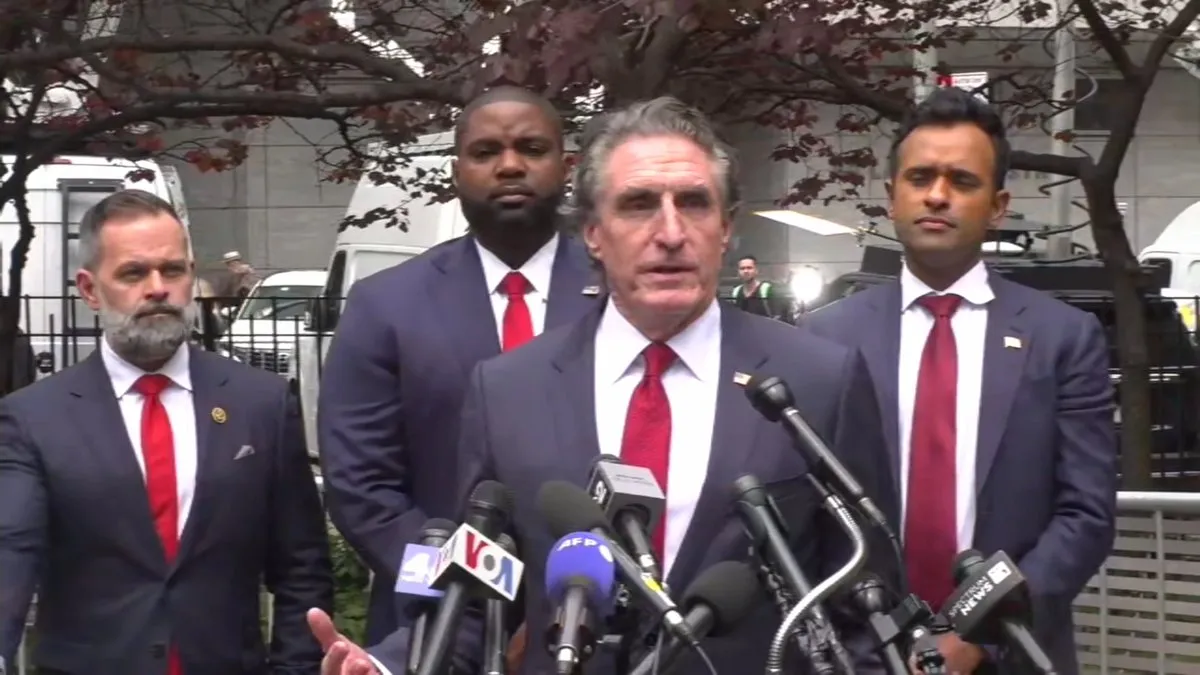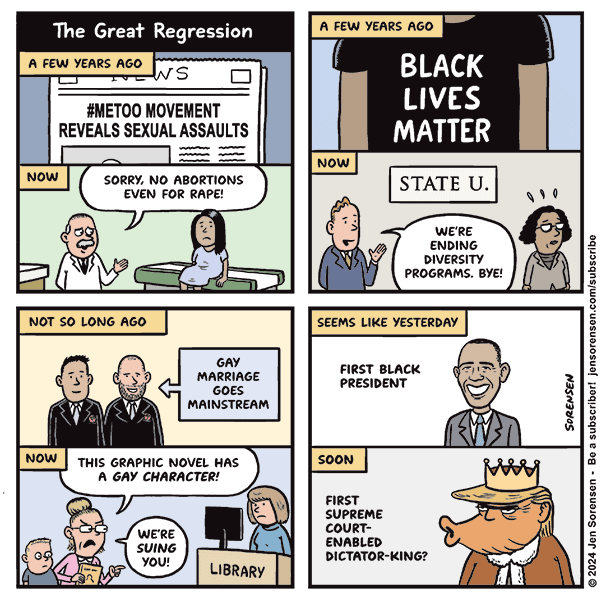The cabinet, the prime minister, they signal to the Shin Bet that if a Jew is killed, that’s terrible. If an Arab is killed, that’s not good, but it’s not the end of the world.
– former Shin Bet head Ami Ayalon
quoted in “The Unpunished: How Extremists Took Over Israel“
This week’s featured posts are “Wide Right: that kicker’s commencement speech” and “Two Significant Articles about Israel“.
This week everybody was talking about Israel and the Palestinians
That’s the subject of one featured post.
and the Trump trial moving towards its conclusion

I’m resisting the urge to write about the trial at length, because there’s one big thing we all want to know right now, and we can’t know it yet: What is the jury making of Michael Cohen’s testimony? I could speculate, I could link to other people’s speculations, or I could cast a hexagram from the I Ching, but in the end there’s nothing worth saying. We won’t know what the jury thinks until it produces a verdict.
Cohen is not quite done testifying yet. Today marks the third day of the defense’s cross-examination and Cohen’s fifth day on the stand altogether. Given how long it’s been since Cohen’s original testimony, the prosecution will probably want to question him in a redirect.
Cohen is the prosecution’s last witness, and the defense has been cagey about who it might call. Maybe Trump? Maybe no one? The burden of proof-beyond-reasonable-doubt is on the prosecution, so the defense could simply rest its case and claim that the burden has not been met. There’s no guessing how long the summation presentations to the jury will take, but we’re probably looking at the trial finishing either this week or next.
One major task for the prosecution’s summation will be to emphasize just how few points of its case rely on Cohen, and how unlikely all the alternative explanations are.
For example, without Cohen we already know that the payoff to Stormy Daniels happened and that Trump CFO Allen Weisselberg agreed to a plan for covertly reimbursing Cohen for fronting this payment. (We know the reimbursement was covert because Cohen was repaid double the amount he had paid Daniels in order to account for taxes. But taxes are unnecessary for a reimbursement. Only that fact that the reimbursement was hidden as “legal fees” accounts for the doubling.) Multiple witnesses have established that Trump was worried about Daniels’ story getting out, and that his worry centered on the election rather than on personal considerations (like Melania’s reaction). Multiple witnesses attest that nothing happened in the Trump empire without Trump’s personal approval.
Only Cohen’s testimony puts Trump in the room when the decisions were made. But if you disbelieve him on this point, what’s the alternative story? That Cohen paid Daniels $130K of his own money without Trump’s knowledge, that Weisselberg and Cohen fooled Trump with the reimbursement scheme, and that Trump signed $35K monthly checks to Cohen for a year without knowing what he was paying Cohen for. Really?
Various Republicans hoping for Trump’s favor have shown up at the courthouse looking like the Dear Leader’s mini-mes. And they wonder why we call it a cult.
Trump continues to be embarrassed that he hasn’t been able to get protesters to show up outside the courthouse, so he falsely claims that police are keeping them away.

and Alito’s insurrection flag

I’m not sure why it took more than three years for this to come out, but an upside-down American flag — the symbol of the pro-Trump Stop the Steal movement — flew over Justice Alito’s home for several days in the weeks following the January 6 insurrection.
Alito’s response to the revelation was ridiculous: His wife did it, in connection with some kind of dispute with the neighbors.
Alito’s statement is notable because, as the Times reporter Michael Barbaro pointed out, it does not deny that the flag was flown in solidarity with the insurrectionists. It also does not disavow the insurrectionist claim that the 2020 election was stolen, and it does not condemn the Trump-directed attempt to overthrow the constitutional order that Alito has sworn an oath to uphold.
Alito is the second justice whose behavior — sorry, sorry, his wife’s behavior — casts doubt on his ability to be impartial to cases involving January 6. (Clarence Thomas’ wife was actively pushing the false story of a stolen election in the lead-up to January 6.)
That raises the most important issue here, which is that Alito and Thomas sit on the nation’s highest court and are poised to rule on matters related to Trump’s attempts to unlawfully hold on to power. In one case, they already have—deciding that the Constitution’s ban on insurrectionists holding office does not disqualify Trump from running for president. The Court is set to rule on a challenge to a federal law used to prosecute the January 6 rioters, and in another case about Trump’s claim that former presidents have “absolute immunity” to prosecution for crimes committed as “official acts” in office. The 6–3 right-wing majority has made its partisan lean unmistakable. But there is still a difference between an ideologically conservative, or even partisan, Court and one with sitting justices whose worldview is so deranged by fanaticism that they would prefer the end of constitutional government to a president from the rival party.
An ethical judge would recuse himself from these cases. But when we’re talking about Alito and Thomas, the good ship Judicial Ethics sailed a long time ago.
and presidential debates

After a back-and-forth of taunts, it looks like there will be two presidential debates. The first is June 15 on CNN, moderated by Jake Tapper and Dana Bash. The second is September 10 on ABC, with moderators not named yet. Both debates will be open to candidates polling at least 15% among likely voters in four national polls. Whether RFK Jr. and his brain-worm will meet that standard remains to be seen.
I continue to be mystified by the negative coverage Biden’s presidential campaign is getting. Trump is currently ahead by less than 1% in the RealClearPolitics polling average, which looks pretty close to even to me. Several polls either have Biden ahead or see the race as tied. And yet Ezra Klein is examining “Why Biden is Losing“. If you just read headlines and don’t bother with the article “Biden is losing” is the only message you’ll get.
Josh Marshall discusses a related issue in “Is Biden in ‘Denial’ about the polls?” Biden, Marshall says, believes the polls don’t show his true strength for a number of reasons. But is that “denial” really?
The factual questions here aren’t terribly complicated and they’re not really the reason I note this article or write this post. Most polls currently show Biden just behind Trump in a tight race. Others show him either tied or just ahead. And there is a theory of the election that those polls, with a greater emphasis on high propensity voters and the concentrating effect of the final months of the campaign, will put Biden on top in November. I’ve tried to air these different arguments here in the Editors’ Blog. You can believe one or the other.
He attributes this pervasive pessimism to a psychological difference between Republicans and Democrats:
If a race is at all close, Republicans think they’re winning, or at least say they think they’re winning. Democrats are the reverse. And if they’re demonstrably winning, they worry that they’re not winning by enough or should be winning by more.
I have my own reasons to believe the polls will swing towards Biden as the election gets closer: Various voting blocs that have been Democratic in recent elections are down on Biden for one reason or another, like Gaza, and are not really thinking about Trump at all. But will young voters really let Big Oil elect a pro-fossil-fuel president? Do pro-Palestinian voters think Trump will be better for them? Do Hispanics really want to see their cousins rounded up in detention camps? I think a lot of those disaffected Democrats will eventually come home.
It doesn’t have to be all of them. I mean, we’re talking about covering a 1% gap.
Trump teased a third-term possibility in a speech to the NRA. In the same speech, a teleprompter malfunction had him completely stymied.
and that kicker’s commencement speech
See one of the featured posts.
and you also might be interested in …
The president of Iran has died in a helicopter crash. Maybe it was bad weather. Maybe it was that Iran’s helicopter fleet has a hard time getting parts, given American sanctions. Maybe it was foul play by either foreign interests or domestic rivals. Too soon to tell.
Governor Abbott pardoned a guy in prison for murdering a Black Lives Matter protester. One of the featured posts discusses how crimes by Israeli settlers against Palestinians have been routinely ignored by the authorities. Well, we have the same pattern here: If you agree with Abbott and kill somebody who disagrees with Abbott, that’s not really murder in Texas.
There’s a strong Nazi parallel here. In the early days of Hitler’s rule, the police were not nearly as scary as they eventually became. But the Brownshirts — non-government Nazi thugs — could do whatever they wanted and the police would look the other way.

A fascinating article in yesterday’s NYT about conservative Christian parents trying to create space in their lives for their transgender children.
The problem with basing a political movement on fiction is that once people get elected they get confronted with reality. Courtney Gore won a school board seat in Texas, pledging to stop the national campaign to indoctrinate children with progressive messages on sex, gender, and race. Once in office, she looked hard for such indoctrination, and didn’t find it. So she changed her mind.
The UAW’s effort to unionize Southern auto plants hit a pothole: The Mercedes plant in Alabama said no. This follows a UAW victory at a Volkswagen plant in Tennessee.
and let’s close with something peaceful
It turns out there’s a whole genre of videos showing natural beauty accompanied by relaxing music. This one focuses on Norway. I haven’t watched the whole thing — who has the time to get THAT relaxed? — but it looks fabulous.


















